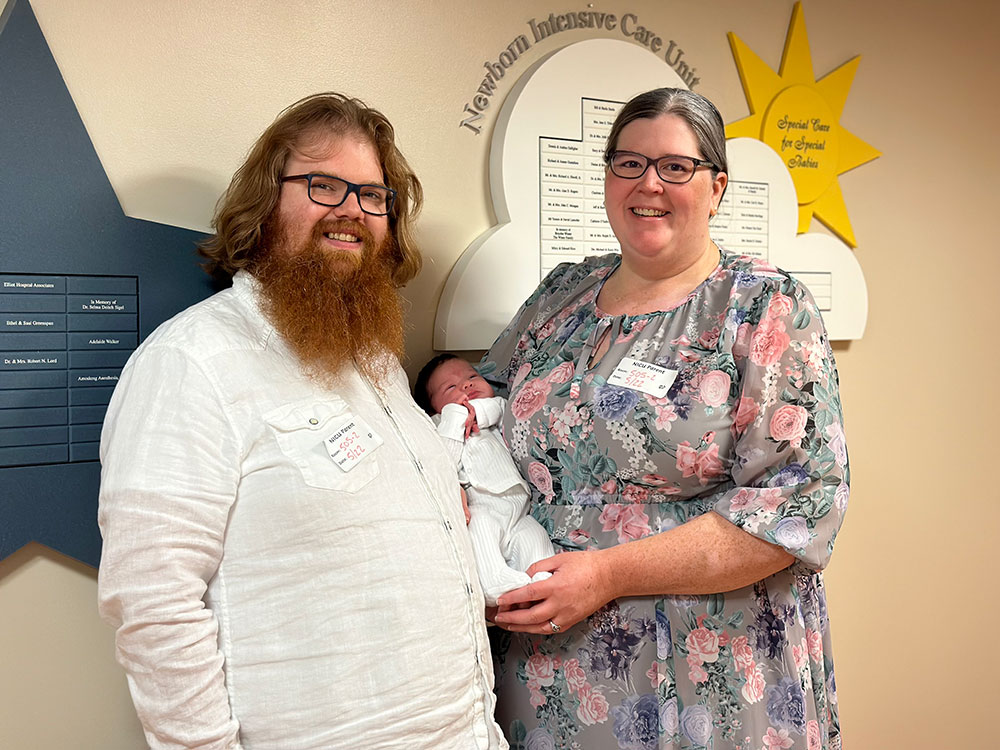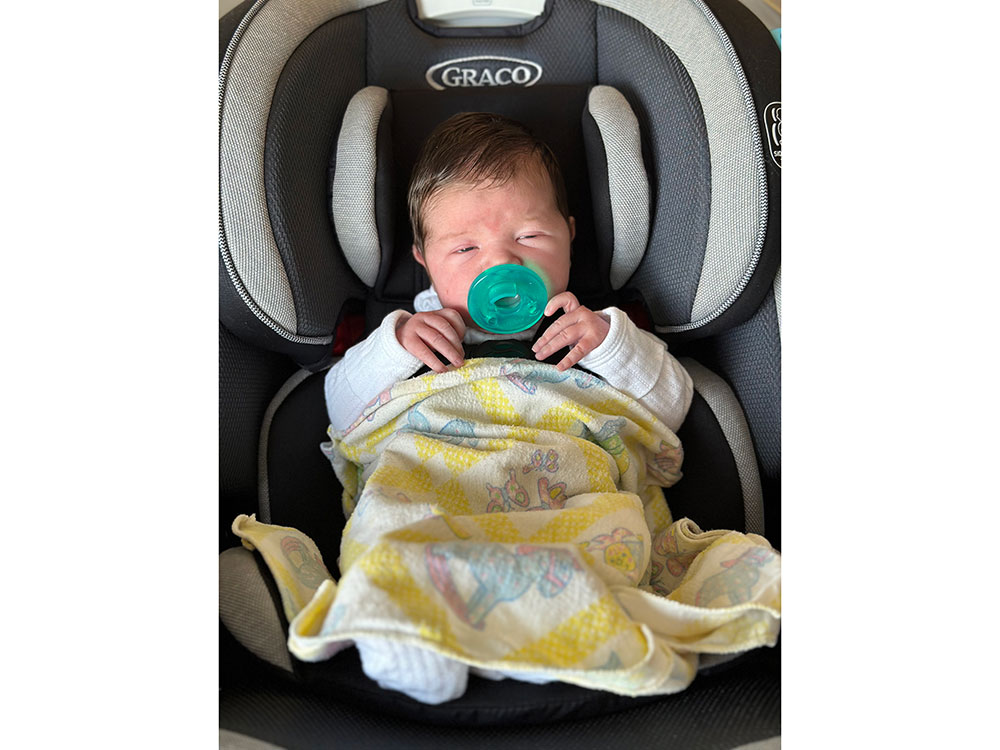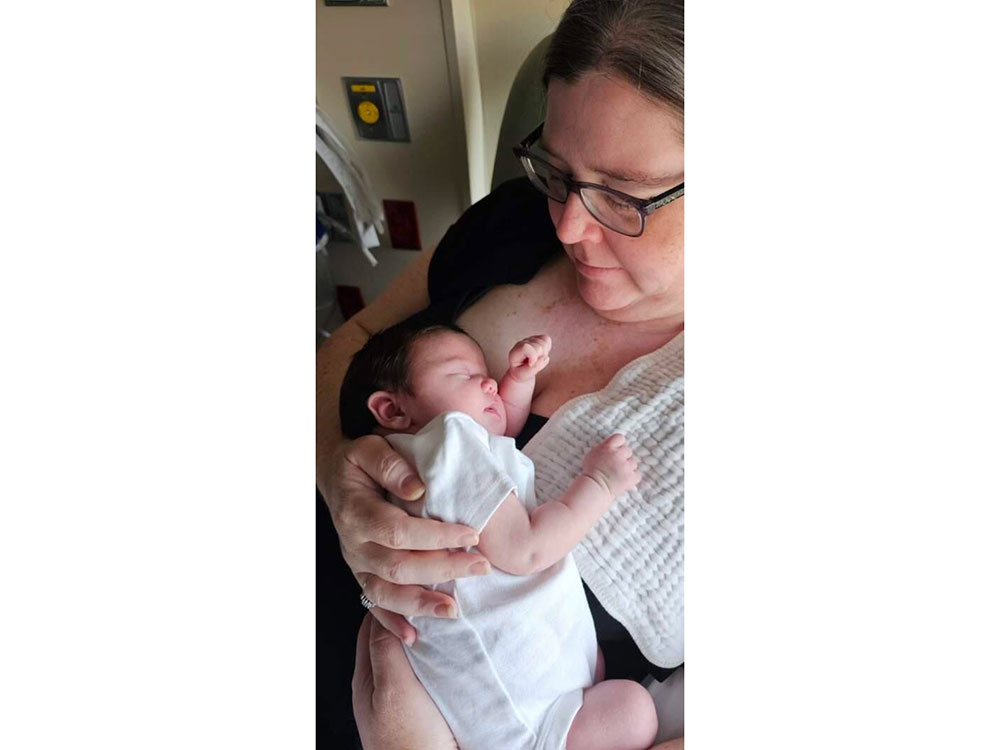


By Jennifer Costa, regional communications director
Kerrin Lucas and Charles Hayes couldn’t wait to become parents. The Portsmouth, New Hampshire couple eagerly awaited the arrival of their first child, who was expected to join their family around May 23, 2024. But as so many birth plans go…
“Pretty much nothing went as planned,” Kerrin remarked.
Due to some risk factors, Kerrin underwent a scheduled c-section. Roisin Lucas-Hayes was born on Monday, May 6, 2024. A bit early, but at 37-weeks, she was considered full-term and weighed a healthy eight pound six ounces. Their little girl was a dream come true.
“It was pure joy. We were immediately in love. Charles held her first, while I was still in surgery,” Kerrin said. “He first noticed her eyes, the perfectly beautiful bluish slate color of them.”
For these new parents, elation turned to panic as baby Roisin started to show signs of respiratory distress.
“She was having some breathing issues. She was in the nursery being monitoring and getting some oxygen. It was Tuesday morning when they realized there was something more serious going on,” Kerrin said.
Roisin was diagnosed with premature lungs – and doctors were concerned about her red blood cell production. She was transferred to a nearby hospital with a neonatal intensive care unit – and placed on a ventilator. Her parents then received more stressful news.
“At just one day old, she would need a blood transfusion to boost her red blood cells and boost the oxygen in her blood to promote healing,” Kerrin shared. “It’s one of those things that you never expect is going to happen to you or your family.”
Kerrin, a board member with our New Hampshire Chapter, said the one comforting part of this whole ordeal was knowing the blood was coming from the American Red Cross.
“I didn’t hesitate for a second to trust the Red Cross and the blood supply we were going to get,” she said. “There’s a chance that Roisin would have been okay without it. But the doctor said, with it, her chances at success increased exponentially. The strain on her body without that blood transfusion would have been extreme. So, I think it’s reasonable to call it lifesaving.”
When it comes to newborns, the smallest patients need the most specialized care. Babies, like Roisin, needing a transfusion as part of medical care can only receive blood from donors who have not been exposed to CMV – or Cytomegalovirus. The flu-like virus is generally harmless to adults but can be fatal to infants. That’s why the Red Cross tests blood donations for CMV antibodies. Most adults are exposed to the virus at some point in their lives. In fact, by age 40, the CMV virus is present in 85% of adults, meaning only a very small number of donors can meet this specific need. At the Red Cross, we call affectionately call CMV negative donors “heroes for babies.”
“It’s like a guardian angel. You never physically see them, but you know someone is looking out for you,” Charles said.
“I can’t imagine how I would have felt if the blood supply wasn’t there. I don’t know what I would have done,” Kerrin added. “The level of appreciation is hard to put into words. We are just so fortunate.”
Roisin received one unit of blood and remained on the ventilator for four days before she was moved to a CPAP – and eventually started to breathe on her own. After two weeks in the hospital, Charles and Kerrin were finally able to bring their baby home.
“In a weird way, I look forward to the things that everyone told me were going to be hard, like waking up in the middle of the night to feed her and hearing her cry. It’s the new baby normalcy that I’m looking forward to most,” Kerrin said.
A normalcy that is now a reality for this family because donated blood was available when Roisin needed it most. It was one donor’s decision to give one pint of blood that gave this little girl the gift of life – an opportunity to grow up and thrive.
“I don't know who gave the blood to save my daughter’s life and will never know, but I am eternally grateful for whom that person may be. For anyone thinking of donating and are on the fence, just think of the possible life you are saving and the families you have helped,” Charles said.
If you are interested in becoming a blood donor and want to learn more, visit redcrossblood.org. One donation can help save more than one life.
To learn more about how you can become a Hero for Babies, click https://www.redcrossblood.org/donate-blood/dlp/donor-rewards/hero-for-babies-rewards.html.
Support all the urgent humanitarian needs of the American Red Cross.
Find a drive and schedule a blood donation appointment today.
Your time and talent can make a real difference in people’s lives. Discover the role that's right for you and join us today!